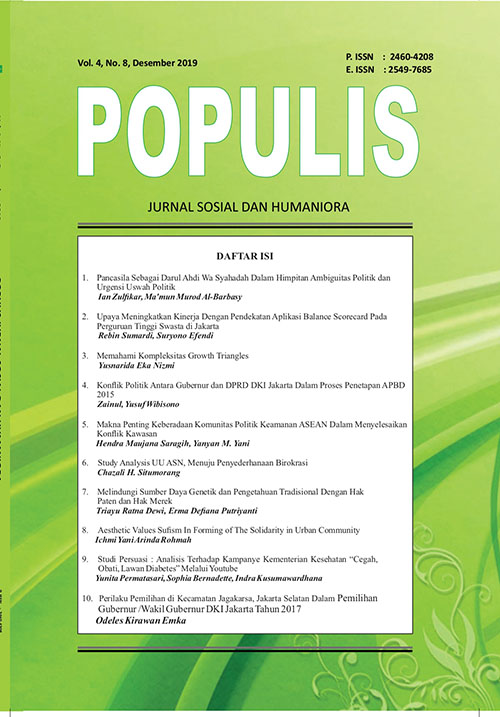AESTHETIC VALUES SUFISM IN FORMING OF THE SOLIDARITY IN URBAN COMMUNITY
DOI:
https://doi.org/10.47313/pjsh.v4i2.700Keywords:
sufism, aesthetics, paguyuban, circle of Friends, urban communitiesAbstract
AbstractSufisme have long been rooted in some groups of Indonesian society. One thing that is unique to the Sufi community in metropolitan cities in Indonesia is that its adherents are not only Muslims but also non-Muslims. Research conducted by the researcher intends to examine the existence of Sufism in the urban community environment, the researcher also examines the aesthetic values of Sufism which are the attraction of urban society to follow Sufi teachings, and researchers conduct research on the solidarity of the community formed in urban communities in Indonesia . The location of this research is in the capital city of Indonesia, Jakarta. This study uses a type of phenomenological (qualitative) research method. Extracting field data using interview, observation, and documentation techniques. The results of the study explain that the teachings of Sufism still exist in urban communities that are in the midst of the life of the metropolitan city of Jakarta, Indonesia. The Sufism community that teaches Sufi teachings can be accepted by most urban communities. One of the driving factors that makes urban society to study the teachings of Sufism is the aesthetic value of Sufism, besides that the Sufism teachings are built in creating community solidarity among urban communities who are very heterogeneous in their socio-cultural background. Sufism aesthetic values can be obtained by adherents through various religiosity activities (dhikr, praying, preaching and shalawat) and the arts of Sufism (music, songs, dances, fashion creativity).
References
Allan, Kenneth. (2006). Contemporary Sosial and Sociological Theory Visualizing Sosial Worlds. London: Sage Publication Ltd.
Fauzi, Ibrahim Ali. (2003). Jurgen Habermas. Jakarta Selatan: Teraju.
Jamaludin, Adon Nasrullah. (2015). Agama & Konflik Sosial (Studi Kerukunan Umat Beragama, Radikalisme, dan Konflik Antarumat Beragama). Bandung: Pustaka Setia.
Odea F, Thomas. (1995). Sociology of Religion. Jakarta: Bumi Aksara.
Rostow, W.W. (1960). The Stages of Economic Growth. Cambdrige University Press. UK.
Saptari, Ratna & Brigitte Holzner. (1997). Perempuan Kerja dan Perubahan Sosial (Sebuah Pengantar Studi Perempuan). Jakarta: PT. Pustaka Utama Grafiti.
Setiadi, Elly M. (2011). Pengantar Sosiologi: Pemahaman Fakta dan Gejala Permasalahan Sosial. Jakarta: Kencana.
Tharaba Fahim. (2016). Sosiologi Agama (Konsep, Metode Riset, dan Konflik Sosial). Malang: Madani.
Tonnies, Ferdinand. (1912). Gemein Schaft und Gessellschaft. Leipzig.
Undang-Undang No. 39 of 1999 tentang Hak-Hak Azazi Manusia.
Undang-Undang Dasar 1945.
Downloads
Published
Issue
Section
License
- Hak publikasi atas semua materi informasi yang tercantum dalam situs jurnal ini dipegang oleh dewan redaksi/editor dengan sepengetahuan penulis. Pengelola Jurnal akan menjunjung tinggi hak moral penulis.
- Aspek legal formal terhadap akses setiap informasi dan artikel yang tercantum dalam situs jurnal ini mengacu pada ketentuan lisensi Creative Commons Atribusi-NonCommercial-No Derivative (CC BY-NC-ND), yang berarti bahwa hanya dengan izin penulis, informasi dan artikel Jurnal BACA dapat didistribusikan ke pihak lain dengan tanpa merubah bentuk aslinya untuk tujuan non-komersial.
- Setiap terbitan Populis Jurnal Sosial dan Humaniora, baik cetak maupun elektronik, bersifat open access untuk tujuan pendidikan, penelitian, dan perpustakaan. Di luar tujuan tersebut, penerbit atau pengelola jurnal tidak bertanggung jawab atas terjadinya pelanggaran hak cipta yang dilakukan oleh pembaca atau pengakses.










